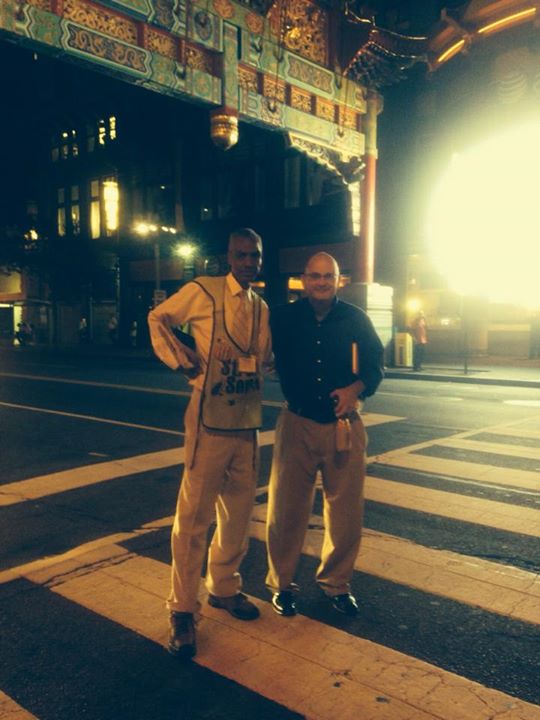For Street Sense vendor L. Morrow –-who requests you just call him “Slim”–Street Sense is another step in his quest to engage with the community at large.
Born and raised in the projects of Southwest Washington, DC, Morrow found himself working with community development organizations in Washington, Chicago and Boston over the years. He attended Jefferson High School and graduated from Bowie State University in Prince George’s County, Maryland.
Morrow doesn’t have to convince me he worked for Peoples Involvement Corporation, ran a free lunch and afterschool program or served as an advocate for a low-income tenant association – the man builds community just sitting along a highly trafficked sidewalk. During the course of our interview he’s had a friendly exchange with fifty percent of the passersby – trading jokes with a courier and calling out to “Young Man,” “This Guy” and “Sister Love.”
“Keep up the kindness, the world needs more of it,” Slim tells another stranger-turned-friend.
Morrow stayed active in the Southwest community until his grandma passed away. Her death left him rudderless and he began to travel. Returning to the District in 2007, Morrow has been selling Street Sense ever since.
“I’ve had millions and I’ve been broke,” Morrow reminisced.
His return to Washington qualifies as one of the times Slim was broke, but he didn’t take long to figure things out. After seeing another Street Sense vendor selling the paper and doing pretty well for himself, Morrow decided to give it a read — and soon after, a sales pitch.
With his big personality, Morrow could easily command attention for a sales pitch, yet he claims to never ask for money.
Instead he aims for the role of advocate and guide, asking pedestrians not to forget the homeless. He can often be found citing statistics on the number of people who experience homelessness – more than 575,000 nationwide on any given night, according to last year’s Point-in-Time count.
“I just wake ‘em up,” Morrow said. “I keep a crowd.”
When Slim notices someone listening to him, he approaches to ask if they have ever read Street Sense. He asks for the persons time, not money.
“I show them my badge and where it says ‘vendor.’ Then I show them the list of the vendors in the front of the newspaper,” Morrow said. “You see that – all these people are homeless; but we’re self-supporting.”
John Engel was one such attentive member of the crowd last fall. He was visiting town for business over several days.
Morrow gave him a tour of the newspaper, telling Engel how it was all about poverty and partially written by people experiencing homelessness – and of course showing him the list of vendors. Engel insisted on giving Morrow the $2 donation listed on Street Sense’s cover.
The next night Morrow was selling on the same corner and saw Engel in the crowd again. He asked if he had read the newspaper. Engle reported that he had not only enjoyed the paper, but was inspired by the way Morrow persevered to sell the newspaper while so many people just walked passed him.
The third night, Engel found Morrow to give him a hug and thank him for his time and inspiration before leaving town.
A week later Morrow received a handwritten thank you note in the mail that he carries with him to this day:

“If you don’t have money, give me a smile,” Morrow often tells potential customers.
Morrow’s unique brand of cheerfulness has turned more than a few heads. Amberly Young, a University of California Santa Cruz graduate who did a portion of her 2010 studies in Washington, was moved to include him in a report she was authoring at the time.
“When I first met Morrow, I had gotten off at the wrong stop on the Metro,” Young writes. “But before I could even pull out my map, Morrow approached me ‘Where would you like to go young lady?’”
Young’s subsequent interviews allowed Morrow to delve deeper into his advocacy than the normal 15-second street corner spiel allows for.
“Shelters are dirty and dangerous,” he told her. “Only the strong survive. It’s like being in jail; shelters corrupt homeless people.”
Morrow wishes top government figures would start paying more attention to homelessness, and suggested to Young that Michelle Obama start a think tank comprised of shelter clients and shelter staff to determine what people really need.
He wants his work to make an impact, even after he is gone.
“The people at the top don’t got any idea about the homeless. They never missed a meal. They don’t know what it is to endure adversity, humiliation, sickness, hunger,” Morrow told Young. “These politicians ride around with a tinted window for a reason, so they can’t see the homeless.”
Despite his despair with our safety net, Morrow stays positive. According to Slim, you have to keep your dignity and your pride.
“Homelessness is a state of mind,” Morrow said. “I’ve slept in a bus stop before, but I’ve never been homeless.”




